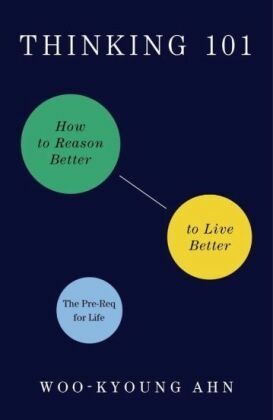Thinking 101 - How to Reason Better to Live Better
| Verlag | Macmillan US |
| Auflage | 2023 |
| Seiten | 288 |
| Format | 13,7 x 20,7 x 1,7 cm |
| Gewicht | 246 g |
| Artikeltyp | Englisches Buch |
| EAN | 9781250805973 |
| Bestell-Nr | 25080597UA |
"An INVALUABLE RESOURCE to anyone who wants to think better." -Gretchen Rubin
Award-winning YALE PROFESSOR Woo-kyoung Ahn delivers "A MUST-READ-a smart and compellingly readable guide to cutting-edge research into how people think." (Paul Bloom)
"A FUN exploration." -Dax Shepard
Psychologist Woo-kyoung Ahn devised a course at Yale called "Thinking" to help students examine the biases that cause so many problems in their daily lives. It quickly became one of the university's most popular courses. Now, for the first time, Ahn presents key insights from her years of teaching and research in a book for everyone.
She shows how "thinking problems" stand behind a wide range of challenges, from common, self-inflicted daily aggravations to our most pressing societal issues and inequities. Throughout, Ahn draws on decades of research from other cognitive psychologists, as well as from her own groundbreaking studies. And she presents it all in a compellingly r eadable style that uses fun examples from pop culture, anecdotes from her own life, and illuminating stories from history and the headlines.
Thinking 101 is a book that goes far beyond other books on thinking, showing how we can improve not just our own daily lives through better awareness of our biases but also the lives of everyone around us. It is, quite simply, required reading for everyone who wants to think-and live-better.
Inhaltsverzeichnis:
Introduction
1. The Allure of Fluency: Why Things Look So Easy
2. Confirmation Bias: How We Can Go Wrong When Trying to Be Right
3. The Challenge of Causal Attribution: Why We Shouldn't Be So Sure When We Give Credit or Assign Blame
4. The Perils of Examples: What We Miss When We Rely on Anecdotes
5. Negativity Bias: How Our Fear of Loss Can Lead Us Astray
6. Biased Interpretation: Why We Fail to See Things As They Are
7. Dangers of Perspective-Taking: Why Others Don't Always Get What's Obvious to Us
8. The Trouble with Delayed Gratification: How Our Present-Self Misunderstands Our Future-Self
Epilogue

